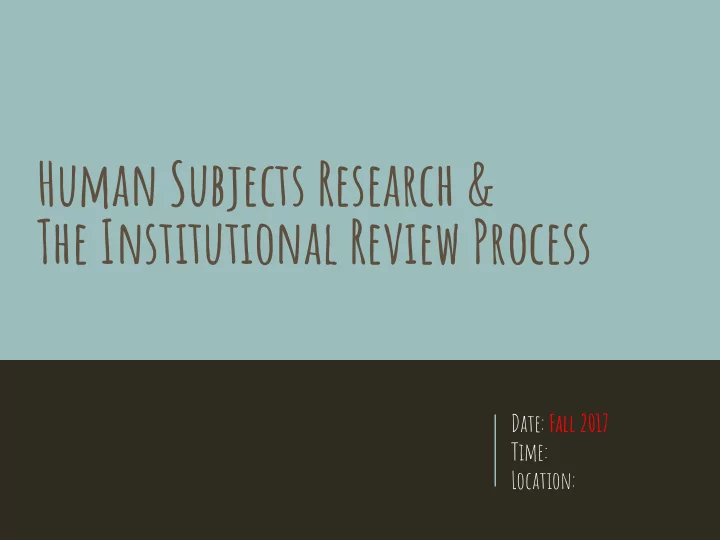

Human Subjects Research & The Institutional Review Process Date: Fall 2017 Time: Location:
Introductions & Contact Information Keenan Dungey, Ph.D. Associate vice chancellor for research & institutional effectiveness email: kdung1@uis.edu Phone: 217.206.8112 Don Long Assistant Director of Research Administration email: ora@uis.edu Phone: 217.206.7409 Jim Klein, Ed.D., LPC Human subjects Review Officer Email: jklei4@uis.edu Phone: 217.206.6883
Presentation Agenda I. What is research? II. What is an IRB? III. Basic Historical & Philosophical Underpinnings IV. Application Requirements & Considerations V. IRB REview Process & Levels of Review VI. Participants & Protections VII. Informed Consent
WHAT IS RESEARCH & WHO ARE HUMAN SUBJECTS? research : a systematic investigation designed to develop or contribute to generalizable knowledge. ★ Non-generalizable knowledge [may require IRB Review]: ★ ■ Biographies ■ Oral Histories ■ Classroom exercises solely to fulfill course requirements or to train students in the use of particular methods or devices ■ Quality assurance activities designed to continuously improve the quality or performance of a department or program where it is not the intention to share the results beyond the institutional community Human Subjects : living individual(s) from whom an investigator conducting research obtains data ★ through intervention or interaction with the individual.
PURPOSE OF THE INSTITUTIONAL REVIEW BOARD (IRB) The IRB serves to protect the rights and welfare of human subjects recruited to participate in research ★ activities involving students, faculty, and staff at UIS Ensure implementation of the Belmont Report : Created by the National Commission for the Protection of ★ Human Subjects of Biomedical and Behavioral Research (1979)
BELMONT REPORT ETHICAL PRINCIPLES: Respect for persons – recognition of personal dignity and autonomy ★ Beneficence – obligation to protect persons by maximizing anticipated benefits and minimizing possible risks ★ of harm Justice – benefits and burdens of research must be distributed fairly ★ COMMON RULE: Provides basic provisions for IRBs, informed consent, & compliance ★
IRB SUBMISSION REQUIREMENTS Protocol (UIS application) – Located on the website: http://www.uis.edu/grants/irb/protocol/ ★ Consent document(s): Checklist on the website: www.uis.edu/grants/irb ★ CITI Training verification for ALL PIs/Research Team members/Responsible Research Supervisors ★ Copy of any questionnaires/surveys/interview questions to be used ★ Consent Documents, email scripts, etc. ★ Letter of authorization for off-site locations (if necessary) ★
REQUIRED CITI TRAINING Instructions on registration & accessing courses/modules are located at: ★ http://www.uis.edu/grants/irb/requiredtrainingforhumansubjectsresearchinvestigators/ Collaborative Institutional Training Initiative ( CITI ) ★ Training is valid for 3 years & The Social and Behavioral Research Basic Course includes: History and Ethical Principles ■ Defining Research with Human Subjects ■ Assessing Risk in Social Behavioral Sciences ■ Informed Consent ■ Privacy and Confidentiality ■ One optional module recommended ■
IRB REVIEW PROCEDURE INTAKE ★ Receive, log, and assign protocol number ■ Check for completeness ■ Date stamp receipt ■ INITIAL REVIEW ★ Complete “Research Description Checklist” ■ Read protocol, methodology, and consent ■ Identify potential level of approval (exempt, expedited, or full board) ■ Identify issues, errors, and omissions ■
review procedures, cont. FOLLOW-UP WITH RPI ★ Notify of protocol # assignment ■ Ask questions for clarification of protocol and procedures ■ Make/Request changes if needed ■ Wait for RPI response ■ FINISH INITIAL REVIEW ★ Verify protocol is complete ■ Prepare letter of approval for exempt/expedited review and date stamp consent form ■ Present protocol, all materials, Research Description Checklist, letter of approval and ■ consent to the Human Subjects Review Officer for final revisions and approval
EXEMPT REVIEW Six specific categories of research that meet exempt status: see list at ★ www.uis.edu/grants/irb/protocol The Human Subjects Review Officer reviews and applies exemption status ★ Status does not remove requirement for informed consent ★
EXPEDITED REVIEW Can be carried out by the IRB chairperson or experienced reviewers ★ Human Subjects Review Officer approves the review ★ Expedited reviews are minimal risk to the participant ★ Nine specific categories in the regulations: see list at www.uis.edu/grants/irb/protocol ★
FULL BOARD REVIEW Required for research that has more than minimal risk ★ Concerns with confidentiality ★ Potential conflicts of interest ★ Complex and controversial issues ★ Protected subjects/participants and/or vulnerable population(s) ★
PROTECTED CLASSES | Vulnerable Populations Children/Minors ★ Prisoners ★ Fetuses and pregnant women ★ Individuals with compromised capacity to consent ★ Terminally ill or comatose patients ★ Students/employees ★
RISKS & BENEFITS SOURCES OF POTENTIAL RISK Harm resulting from participation in the research ★ example: acute emotional reactions to certain questions, physical stress, reaction to ■ medication, etc. Harm resulting from breach of confidentiality ★ example: recruitment practices, sample size, data collection practices, storage/management of ■ identifying information & data, reporting, presenting, & publishing, etc. BENEFITS THAT CAN BE REASONABLY EXPECTED For the subject or others ★ Should not be overstated or coercive – factual ★
PROTECTING RESEARCH DATA REASONABLE SECURITY STEPS include, but are not limited to: Controlled access privileges ★ Firewalls ★ Encryption ★ Limited Internet access on computer ★ Physical restrictions to computer (locked room, etc.) ★ No electronic transmittal of data ★ No uncontrolled duplication of data (sharing or storage) ★
WHAT IS INFORMED CONSENT? INFORMED CONSENT: voluntary agreement based upon adequate knowledge and understanding of relevant information ★ to participate in research ASSENT: agreement by an individual not competent (or capable) to give legally valid informed consent to ★ participate in research
GENERAL REQUIREMENTS OF INFORMED CONSENT Must give the subject opportunity to consider participation and minimize possible coercion or undue influence ★ Must give subject adequate time to ask questions ★ Use of incentives – must be balanced with the situation ★ Gift cards, money, extra credit in a course, etc. ■ Must include odds of winning if not given to everyone ■ Must be applied equally to all subjects ■ Must include explanation should incentive by removed or reduced based upon participation, etc. ■
Recommend
More recommend